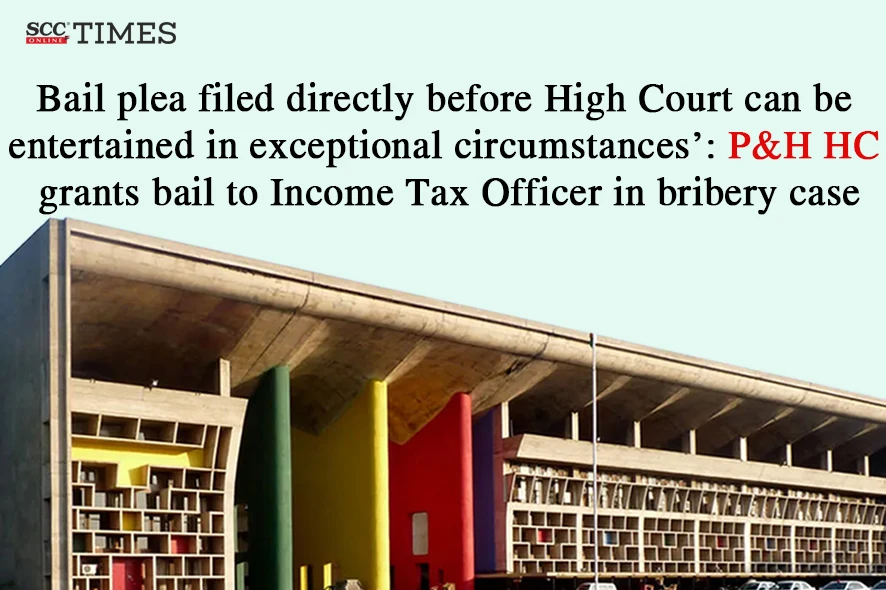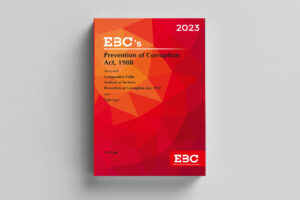Punjab and Haryana High Court: In the present case, a petition filed by the petitioner, a senior Income Tax Officer, under Section 483 of the Bhartiya Nagarik Suraksha Sanhita, 2023 (‘BNSS’) for grant of regular bail in FIR registered for the offences punishable under Sections 61(2) and 308(2) of the Bhartiya Nyaya Sanhita, 2023 (‘BNS’) and Sections 7 and 7-A of the Prevention of Corruption Act, 1988 (‘1988 Act’). Single Judge Bench of Sumeet Goel, J., opined that there was no indefeasible right vested in the petitioner to approach the High Court directly for grant of regular bail bypassing the forum of Sessions Court. The Court held that a plea for grant of regular bail, filed straightaway before the High Court in the first instance, ought to be entertained only if there would be exceptional circumstances made out. Thus, the Court ordered the release of the petitioner on regular bail.
Background
In the present case, the petitioner, colluding with the co-accused, was involved in a case registered by the Central Bureau of Investigation (‘CBI’) under the 1988 Act and BNSS. It was alleged that both the accused persons demanded illegal gratification of Rs 45 Lakhs for resolving issues pertaining to an income tax notice etc. issued to the complainant. Thus, the FIR was registered.
The CBI laid out a trap on the day of registration of the FIR and the co-accused was apprehended at the residence of the petitioner while accepting bribe of Rs 25 Lakhs on his behalf from the complainant. Thus, both the accused persons were arrested pursuant to recovery of the bribe money.
The petitioner contended that he was a man with clean antecedents. On the other hand, the respondent contended that the petitioner did not deserve the concession of regular bail since the petitioner had blatantly misused his official position and arranged the demand of illegal gratification through co-accused.
Issues, Analysis and Decision
Whether the petitioner was entitled to straightway approach the High Court for grant of regular bail without approaching the Sessions Court first? If so permissible in law, whether the petitioner had an absolute right or it stood circumscribed by certain factors?
The Court applied the Golden Rule of statutory interpretation and opined that Section 439 of the Criminal Procedure Code, 1973 (‘CrPC’) or Section 483 of the BNSS demonstrated the legislative intent to vest the concurrent jurisdiction in both the High Court and the Court of Session for the grant of bail.
Thus, the Court observed that there was no statutory impediment for an accused to exercise a choice in directly filing a plea for the regular bail before the High Court and not approaching the Sessions Court in the first instance. The Court considered that while the statute might not bar the maintainability of a plea, it would not automatically render the plea desirable for consideration and opined that a litigant who bypassed the Sessions Court and directly approached a higher Court tested the limits of the statutory grant. Further, the Court held that the statutory mandate, contained in Section 483 of the BNSS ought not to be interpreted as the remedy of seeking regular bail before Sessions Court went into oblivion.
The Court observed that a plea for grant of regular bail, filed straightaway before the High Court in the first instance, ought to be entertained only if there would be exceptional circumstances made out. Further, the Court opined that there would be multitude of factors which might result in exceptional circumstances enabling an accused to file, maintain and pursue his regular plea before the High Court straightaway, like:
-
if the incident/crime involved caused tangible circumstances adverse to the accused in approaching the Sessions Court,
-
if there were perceptible difficulty for the accused to approach the Sessions Court compared to the High Court,
-
if the plea involved complicated questions of law, etc.
Considering that the nuanced contours of exceptional circumstances were inextricably woven into the singular factual matrix of each individual case, the Court stated that it was neither conceivable nor desirable to lay down any exhaustive set of guidelines to govern the exercise of this jurisdiction and such discretion ought to be exercised by a Court, in accordance with the principles of justice, equity and good conscience.
Therefore, the Court opined that there was no indefeasible right vested in the petitioner to approach the High Court directly for grant of regular bail bypassing the forum of Sessions Court.
Whether the petition at hand ought to be entertained and granted?
The Court observed that it was persuaded to exercise its discretion in favour of entertaining the instant petition as a petition wherein a declaration had been sought regarding the alleged illegality of his arrest was already pending adjudication before the Court. Considering that the culmination of the trial would take its own time in view of the voluminous evidence and number of witnesses, the Court opined that keeping the petitioner behind the bars for an indefinite period would not serve any substantial purpose once the investigation was complete.
Thus, the Court allowed the petition and ordered the release of the petitioner on regular bail on his furnishing bail/surety bonds to the satisfaction of the Special Judge/Duty Magistrate concerned.
[Amit Kumar Singal v. CBI, 2025 SCC OnLine P&H 5826, decided on 18-8-2025]
Advocates who appeared in this case:
For the Petitioner: Vikram Chaudhri, Senior Advocate and Divya Bhagwan, Advocate
For the Respondent: Ravi Kamal Gupta, Retainer Counsel, S.P. Jain, Senior Advocate, Meghna Malik, Advocate and Gagandeep Jammu, Advocate




